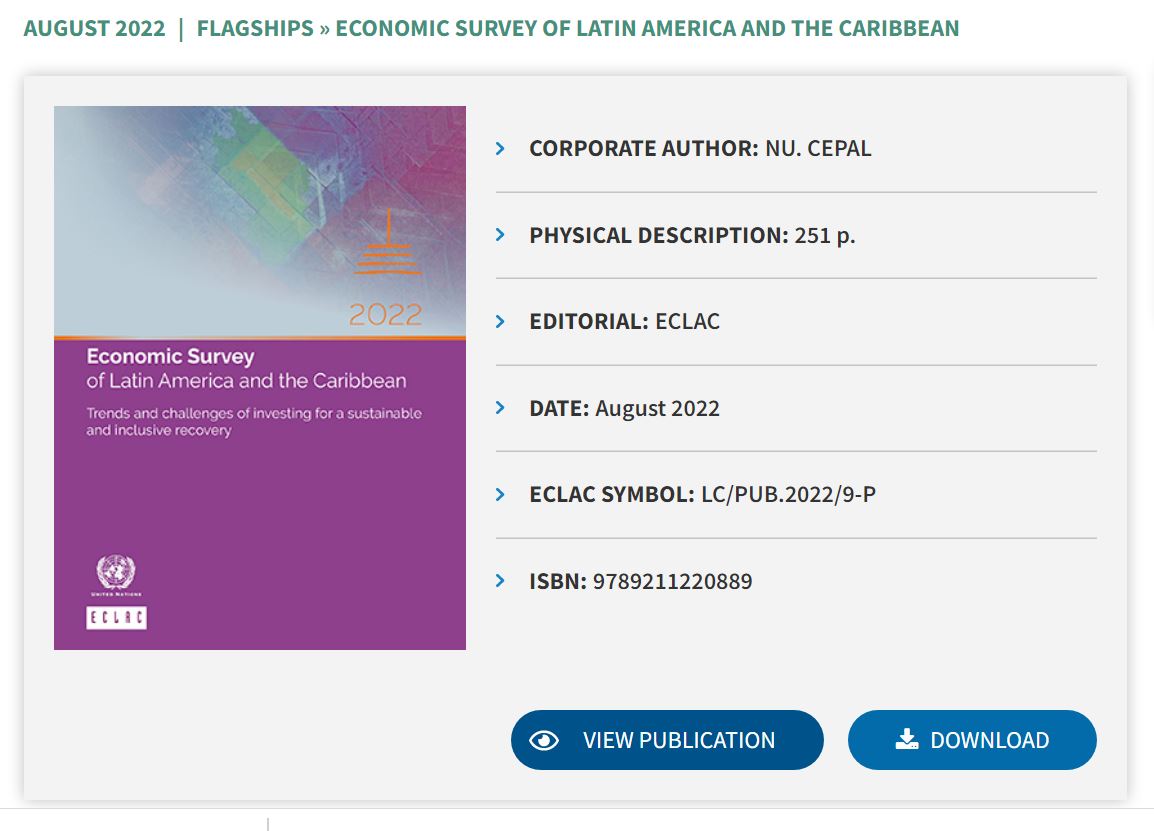Tag: economics
Economic Survey of Latin America and the Caribbean 2022: Trends and challenges of investing for a sustainable and inclusive recovery
The United Nation’s ECLAC has published a 2022 report on trends and challenges of investing for a sustainable recovery in Latin America and the Caribbean. Below is the self-description, “The 2022 edition of the Economic Survey of Latin America and the Caribbean consists of three parts. Part I outlines the region’s economic performance in 2021, analyses trends in the early months of 2022, and the outlook for growth for the year. It examines the external and domestic factors that have influenced the region’s economic performance in 2021, trends for 2022, and how these factors will affect economic growth in the coming years.
Part II of this edition presents some region’s main challenges in investing for sustainable and inclusive economic growth. It analyses the trends in total investment over the last 70 years and highlights the profound change brought about by the 1980s debt crisis, with a slowdown in investment from the 1990s onwards.
Part III of this publication may be accessed on the Economic Commission for Latin America and the Caribbean (www.eclac.org). It contains the notes relating to the economic performance of Latin America and the Caribbean countries in 2021 and the first half of 2022, together with their respective statistical annexes. The date for updating this publication’s statistical information was 15 July 2022.”
Please click on the image to access this Open Access publication.
Arnold Harberger: New Oral History for Economist Life Stories
We are pleased to launch the next interview in the Economist Life Stories Project: Sense and Economics: An Oral History with Arnold Harberger. This oral history with Arnold Harberger was conducted in seven day-long sessions in Los Angeles, CA from the fall of 2015 to the fall of 2016. Dr. Harberger is the Gustavus F. and Ann M. Swift Distinguished Service Professor Emeritus, University of Chicago and Professor of Economics Emeritus, University of California, Los Angeles. He is perhaps most widely known for overseeing the USAID Chile Project, which trained Chilean students in economics who then went on to found programs in economics and take up positions in the Chilean government. However, that story is merely one in Dr. Harberger’s sixty-five-year career in technical assistance and education around the world. He has consulted for the US government, numerous individual nation states, as well as institutions such as the US Agency for International Development, the World Bank, and the International Monetary Fund. Of equal importance is his career as a scholar, from his training and interest in international trade to his work in public finance, especially project evaluation and benefit-cost analysis. Throughout, this oral history explores his lifelong pursuit of “real-world economics,” research that both draws from and supports economic policymaking.
Financial support for this work was provided by Richard Elden, a member of the Becker Friedman Institute Council, whose contribution is gratefully acknowledged.
Although this project focuses on the leaders and students of the University of Chicago Department of Economics, the Graduate School of Business, and the Law School, we hope to add more stories from economists around the world as the project expands.
